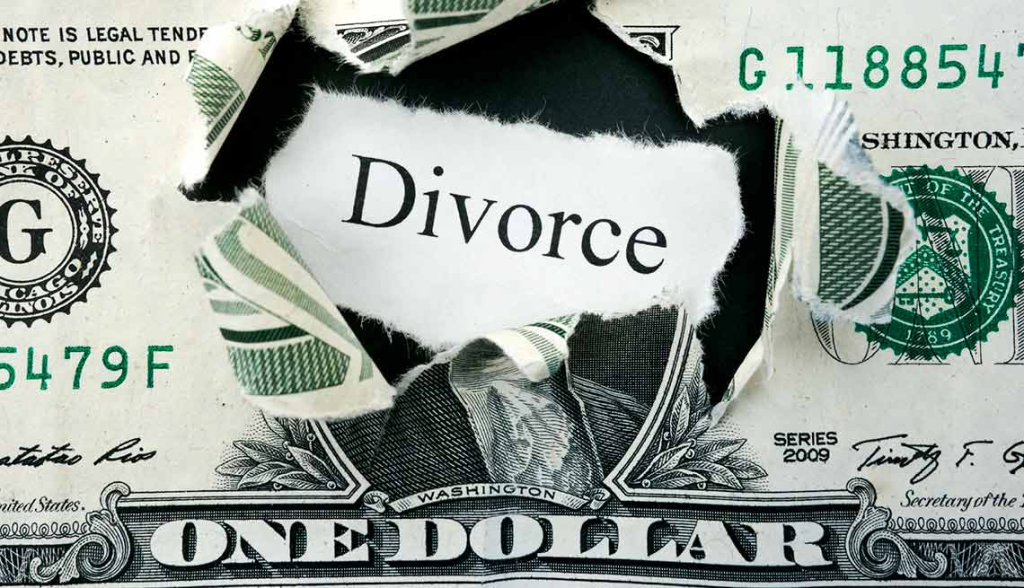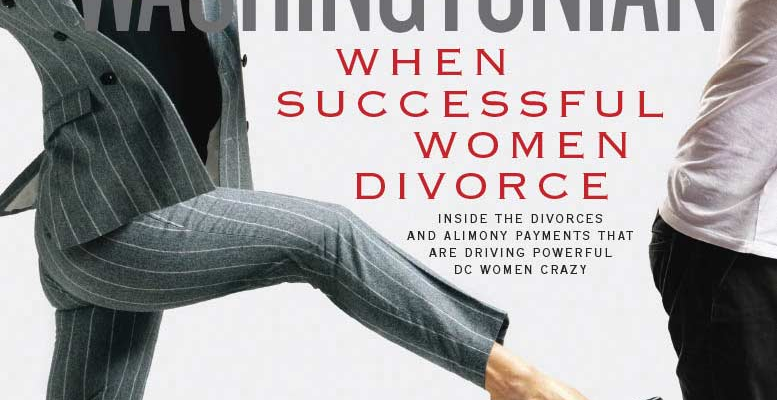NO SHIT!?! So you(females) are mad because you have to pay spousal support?!? Why? Males are expected to pay and had better not say a word about it or suffer the wrath of a judge overseen the case. So now that females are having to do the same, i’m hearing it’s not right, it’s different, oh..he a man he should get a job!?! LOL! STFUP! Ya’ll ass started it so you can blame ya selves for it. Pay up…. just like ya tell males! Step up and be a woman!!!!! SG64
Women having to pay alimony to their ex-husbands isn’t unheard of. In fact, the trend also known as manimony is one that’s becoming increasingly more common. Women have fought hard for social equality and have worked their way up corporate ladders, taking home increasingly more money each year.

Do I have to support my husband after divorce?
According to the U.S. Census Bureau, one out of four women in heterosexual marriages makes more than their husbands. So when it comes to divorce, do breadwinner wives have to pay alimony to their soon-to-be-ex-husbands? The answer: Yes.
The typical narrative around child support and alimony is that, for better or worse, husbands pay it to their ex-wives. But there’s a growing demographic of Washington women who emerge from their marriages as the payers, not the recipients, of this kind of financial restitution. (Some of them have already coined a term for this phenomenon: They joke that they’re paying “galimony.”) And while no one is ever thrilled at the prospect of writing checks to an ex, divorce attorneys around the region report that a rising contingent of these female payers react to the prospect of sending support payments with pure, hot rage.
“What’s noteworthy to me is the fury of the women,” says Heather Hostetter, a prominent divorce lawyer in Bethesda who handles cases in Maryland and DC. “I just don’t experience that as much with men who are confronted with the fact that they have to pay alimony. And part of the fury relates to this idea of ‘What exactly am I paying for?’ ”

Not to suggest that every divorcée responds that way—some, especially those with kids, feel just fine about providing financial support—but that there’s a subset who do. Often, these are women whose husbands did not expect to be the lower-earning partner in their marriage and subsequently did not take that role reversal well. Instead of stepping up at home, the husbands leaned way back . . . and then, when it all ended, demanded the right to maintain their lifestyle.
“It may be a shock to some women [because] they are not interested in supporting, nine times out of ten, what they call the ‘loser’—and that’s why they’re getting out of the marriage, because he’s a ‘loser,’ or he’s strayed, or whatever it might be,” says Cheryl New, a family lawyer who has been practicing in Maryland and Virginia for three-plus decades. “I think it is really hard emotionally for women to wrap their arms around this phenomenon.” Especially considering that in Maryland, Virginia, and DC, it doesn’t even matter how long (or short) your marriage was—you can still be made to pay.
In legalese, money for your ex is called alimony in DC and Maryland; in Virginia, it’s spousal support. But the word “alimony” can be so radioactive that some attorneys avoid its use colloquially; the euphemism of choice to describe payments for both children and a former spouse is “support.” In all three jurisdictions, “child support” is just that. But recipients don’t have to account for how they spend the money, so if kids are involved, that child support could go toward your daughter’s soccer cleats, could be blown on his new Xbox, your guess is as good as anyone else’s.

For Michelle, the notion that her ex was somehow entitled to money from her, given the circumstances, was infuriating. “I spent a lot of time being very bitter over how betrayed I felt,” she says, adding that it took her three years to pay off all kinds of expenses she incurred during the marriage and the divorce: a six-figure sum, in her estimation.
“I think it’s important to go back to: Why was alimony created in the first place?” Michelle says. “It’s not just as simple as saying, ‘Because men pay it, women should pay it, too.’ ” Or is it?Historically, a woman had alimony rights because she had no property rights during marriage—an interesting tradeoff, that—and zero ability to earn her own money. (Alimony, then and now, wasn’t really about the woman’s well-being so much as protecting the state from the undue “burden” of taking care of her when her husband didn’t want to provide for her anymore.) In 1979, citing the Equal Protection Clause of the 14th Amendment, the Supreme Court determined that this “unequal treatment,” wherein men are always payers and women the inevitable payees, was unconstitutional, thereby striking down an Alabama statute that required only men to pay alimony to women.
So why does alimony—a.k.a. spousal support—still exist? The modern justification is threefold: One, if a couple has children, the court doesn’t think it’s in the kids’ best interest for their quality of life to seesaw wildly between their parents’ homes. Two, a person without an income could very well end up relying on resources such as food stamps or other kinds of government support. The court is not so hot on that prospect. The deal is, hey, you married them—you don’t get to make them the state’s problem just because you don’t like them anymore. And three: A lot of spouses—typically wives—sacrificed earning power in order to do the bulk of the home-front labor, a career penalty for which alimony might compensate.

Until recently, payers could ease their pain with the knowledge that their alimony was a tax write-off—as Hostetter puts it, “the greatest tax deduction known to man.” Since January 1, 2019, though, that’s no longer the case. Alimony is now, in theory, just some genderless thing in which resources flow from the higher earner to the lower or non-earner. In practice, it has virtually been a given for the last half century or so that the higher-earning spouse would be male. (See: the pay gap, abysmal/nonexistent parental-leave policies, insidious cultural norms that keep women from achieving their full economic potential.)
But this given is a given no longer, says divorce lawyer Sandy Ain, whose name you’ll surely recognize if you followed stories about the splits of mega-lobbyists Tony and Heather Podesta (Ain repped Tony) or mom-and-pop-shop owners turned retail multimillionaires Herbert and Gloria Haft (Ain repped Herbert). “Years ago, you virtually never had a woman who was in a greater-earning situation than her spouse,” says Ain. Today, “it’s certainly not uncommon for it to occur.” For the first time in American history, a critical mass of women are paying their male exes support.
This occurrence is especially common in DC, where—as straight, single women have probably told you—single, college-educated men are outnumbered by their female peers 53 to 47. The Washington area is home to approximately 40,000 more single women with bachelor’s degrees or higher than single men of the same academic pedigree.

And some of those women are making some serious money—so much, in fact, that in the event they wind up divorcing, they need a professional to help them navigate their staggering assets. So they call Dianne Nolin, a certified divorce financial analyst (yes, that’s an actual accreditation) in Vienna who works with high-net-worth women. Nolin’s specialty: zeroing in on the nitty-gritty of who gets what. Is the beach house worth more to her than the pied-à-terre in the city? Does he really need the BMW SUV when they both know he’s not planning to do after-school carpool? Her client base: executives at major corporations, attorneys, business owners, medical professionals, and some top real-estate agents. “When you consider the compensation package that might be some of those things in addition to traditional earnings, they’re typically in the $750,000 and above, a million and above,” Nolin says. “High six figures.”
Given the lifestyles both parties are used to, the payouts for the spouse-of-the-power-spouse can be substantial. “It’s not uncommon to see support that’s six, eight, ten thousand a month,” Nolin says. “I have one [Virginia] case, an executive at a Fortune 500 tech company, where [support] was upwards of $18,000 a month.”
One ex I spoke to told me that when she and her husband split four years ago, “he cleared the house out when he left. He took the TV, the china, my flatware. All of the things you would anticipate a man would say, ‘I don’t want this, you can have it.’ ” She pays child support and covers major bills for the kids—tuition, camp, insurance. “It’s a harsh reality,” as she put it. “I often look in the mirror and wonder whether this whole feminism thing backfired on me.”

Washington is also a hotbed of cross-income dating, possibly more than any other American city. Consider the contributing factors: a high density of very impressive but generally-less-than-lucrative professional fields—the federal government, journalism, nonprofits, academia—alongside employers that pay buckets of money, like Big Law and lobbying, political-consulting outfits, and tech companies. You’ve got disparate income brackets that attract nearly identical breeds of people: alumni of competitive schools with similar backgrounds and shared cultural references.

Ann Heche ($275,000, plus child support)
This actress’ divorce from her husband Coley Laffoon was not short of its harsh words and drama. At one point Heche allegedly called Laffoon a deadbeat dad and Laffoon called Heche “crazy” in court papers. Nonetheless, Laffoon requested $33,000 in spousal support and custody of their son Homer.1
In lieu of spousal support, according to the Associated Press, Heche was ordered to pay her ex-husband a lump sum of $275,000, as well as $3,700 a month in child support.
Halle Berry ($16,000 per month in child support)
Following her split with model Gabriel Aubry, Halle Berry agreed to pay $16,000 a month in child support. This sum, which amounts to about $200,000 a year, is to cover the expenses of her six-year-old daughter Nahla. She is required to continue making these payments until her daughter graduates high school.
Anna Faris ($900,000)

Actress Anna Faris and Benjamin Indra tied the knot in 2004. Following the marriage, Faris’ career took off. However, Indra’s career stalled. As a result, Faris was considered the primary breadwinner and was ordered to pay Indra $900,000 in spousal support.
Elizabeth Taylor ($1 million)
After meeting construction worker Larry Fortensky while in rehab, actress Elizabeth Taylor decided to marry him in 1991. Fotensky was 20 years younger than Taylor and understandably, far less wealthy. After five years of marriage, the two divorced and Fortensky was awarded $1 million in spousal support.2
Kirstie Alley ($6 million)
At the height of her acting career following years spent as a staple on the show “Cheers,” Kirstie Alley was making news for more personal reasons. In 1997 when she divorced her husband Parker Stevenson, she was sued for spousal support.
In order to maintain, “a lifestyle commensurate to that which Kirstie and (Stevenson) enjoyed during (their marriage),” Stevenson requested $18,000 a month to pay rent for a home in Bel-Air. They eventually agreed to a one-time $6 million payout.

Britney Spears ($20,000 per month in child support)
Pop singer Britney Spears divorced her husband Kevin Federline in November of 2006. The couple had a prenuptial agreement that said she would have custody of their two children if they split. However, she lost custody when she allegedly began engaging in odd behavior such as the famous “head-shaving” incident. She also had two stints in rehab. The court ordered her to pay Federline $20,000 a month for child support.
Janet Jackson ($15 million)
After nine years of marriage, Janet Jackson’s very private marriage came to an end when her husband Rene Elizondo filed for divorce. Elizondo reportedly sued Jackson for $25 million in spousal support. After a two-year legal battle, she eventually agreed to pay her ex-husband a sum of $15 million.
Roseanne Barr ($50 milliion)
Roseanne Barr and fellow comic Tom Arnold split in 1994, just four years after getting married. Against the advice of their attorneys, they did not sign a prenuptial agreement. Roseanne was reportedly forced to pay her ex-husband a lump sum payment of $50 million in spousal support.

Madonna ($76-96 million)
Madonna is not just another female celebrity who had to pay her male ex-counterpart a large sum for spousal support. Her payout may have been one of the largest ever in a divorce settlement. When she split from her husband Guy Ritchie, the divorce settlement was reportedly between $76 and $96 million (although the two officially tried to keep these details private).
Welp! You(Females) wanted to be treated fairly so here you go! FAIR TREATMENT!SG64


[…] https://sungod64.wordpress.com/2022/05/10/more-and-more-women-are-paying-alimony-to-ex-husbands-and-…Wendy Williams won’t have to fork over alimony payments to her ex-husband Kevin Hunter, according to court documents obtained by Radar Online. In December, Hunter filed a lawsuit demanding for the media titan to resume alimony payments after she stopped sending spousal support in October 2021. Hunter claimed he was “broke” and couldn’t “pay his bills,” but this week, a New Jersey judge dismissed the suit.According to the court docs, the judge found Kevin’s demands “not emergent” and tossed out the suit “without prejudice.” The judge also denied Hunter’s previous request for Williams to pay his attorney fees.So far, it looks like Wendy is in the clear, but things could change if Hunter decides to take the case to mediation.“The parties are to participate in binding arbitration,” the judge said in a statement. “The issues surrounding the severance payments, and the [Qualified Domestic Relations Order] are disputed and therefore need to be mediated.”In his suit, Hunter, 50, claimed that the former shock jock stopped doling out alimony around the same time she lost her contract with Talk WW, the production company behind The Wendy Williams Show.Wendy’s lawyers filed a separation motion noting that the star had fallen into a financial rut after she was suspended from the popular daytime talk show. Documents showed that she had stopped receiving a salary in October 2021, around the same time she had gone missing from the show due to several health struggles.“On October 15, of 2021 plaintiff was informed by Talk WW that her contract was being suspended and that no compensation shall accrue or be payable to plaintiff for the duration of plaintiff’s disability and incapacity,” stated Williams’ attorney.They also noted that Hunter “understood and agreed” that “all Severance Payment shall be subject to either termination or modification” if Wendy’s contract was “not renewed and/or otherwise suspended, canceled or terminated.”Kevin Hunter claimed he couldn’t pay his homeowner fees and car insuranceIn his desperate request last year, Hunter claimed he had fallen behind on multiple bills.“I currently live in a community that requires payments to the homeowner association and I’m behind on that bill. If the homeowners association fees are not paid foreclosure will soon follow,” his plea read.“My car insurance hasn’t been paid as a result of not receiving monthly severance payments. I’m behind on credit card payments because I have no money since the severance payments were suspended,” he continued.“My life has been greatly affected since the plaintiff stopped making payments under our settlement agreement,” Wendy’s ex added. “The fact that I am unable to sustain my life and pay my bills in order is extremely emergent to me.https://madamenoire.com/1335276/wendy-williams-alimony-kevin-hunter/?itm_source=madamenoire.com&itm_medium=mn_below_the_fold&itm_campaign=recirc_widget&itm_content=well I cannot pay my bills and sustain my day-to-day living.”Williams jumped the broom with Hunter in 1997 but filed for divorce in 2019 after he welcomed a child with his then mistress-turned wife, Sharina Hudson. […]
LikeLike